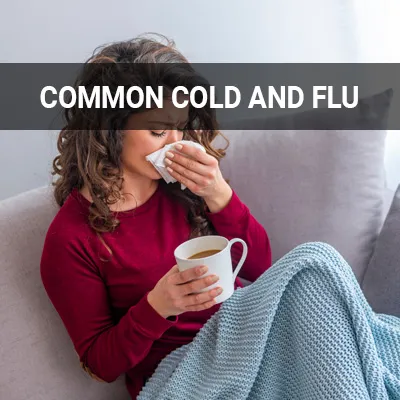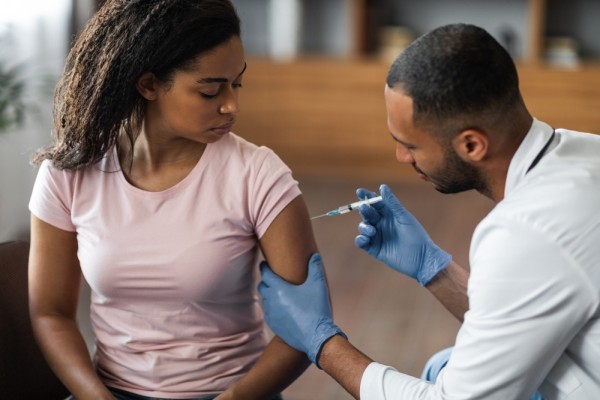Immunizations, Vaccinations and Flu Shots Sterling, VA
Immunizations, vaccinations, and flu shots are essential for preventing the onset of harmful infections, including influenza, tetanus, and hepatitis A and B. Vaccinations — which are completely safe — help the body fight off and build up an immunity to certain viral and bacterial infections, which otherwise pose a great risk to our health.
While the body is often able to fight off infections such as influenza without too much difficulty, developing such infections naturally can lead to an extreme amount of discomfort and a risk to your long-term health. Instead, it is best to prevent the infection altogether by giving your body what it needs to build up an immunity. At our urgent care facility, we can ensure that the vaccination is administered safely.
Immunizations, vaccinations, and flu shots are available at Millennium Medical Care Stone Springs in Sterling and the surrounding area. Our staff can help you determine whether any of these shots are right for you. Call us at (703) 665-3242 to visit our urgent care center for an evaluation today.
Urgent Care for Immunizations, Vaccinations, and Flu Shots
It is important to stay up to date on all necessary and highly recommended vaccinations. Our urgent care facility can help patients determine whether they and their children are up to date on vaccinations, answer any questions about vaccinations, and administer any immunizations, vaccinations, or flu shots necessary.
Facts from The World Health Organization and CDC
- Immunization currently prevents between 2-3 million deaths each year.
- More children are being immunized worldwide than ever before.
- Important progress has been made in vaccine research and development, including a vaccine against malaria.
- Vaccines serve as a frontline defense against antimicrobial resistance.
- Without vaccination, you may be at risk for serious diseases that are common in the U.S.
- You can still receive a chickenpox vaccination as an adult.
- Flu shots protect against three to four different strains of the influenza virus.
“Immunization currently prevents between 2-3 million deaths each year.”
Flu Shots
Influenza, more commonly referred to as the flu, is a viral infection that affects the respiratory tract. The flu is frequently confused with the common cold, although they are completely separate illnesses, and the flu is often much more serious. The main symptoms of the flu include a cough, sore throat, body aches, fatigue and a possible fever.
While most cases of the flu are easily treatable with antiviral medication and proper rest, it is best to take preventative measures that limit contracting the flu. One of the most effective ways to prevent the flu is with a flu shot. This vaccination involves injecting a small sample of the virus into the body and allowing the body, allowing it to fight off the virus naturally. In most cases, receiving a flu shot does not cause any side effects, although there may be minor flu symptoms such as fatigue and a slight fever that follow.
The best way to prevent the flu is by receiving a flu shot yearly. While the flu shot can be taken at any point throughout the year, it is recommended during the fall season. Taking the flu shot in the Fall allows the body's immune system to prepare for the cold, winter months when the flu is most prevalent.
“The flu is frequently confused with the common cold, although they are completely separate illnesses, and the flu is often much more serious.”
Other Important Vaccinations and Immunizations
Along with receiving a yearly flu shot, several other vaccinations can be beneficial for preventing a variety of infections. Common immunizations that we can administer at our urgent care facility include Hepatitis A and B, measles, mumps and rubella (MMR), and the tetanus shot. While there are more vaccinations available and every individual has their own vaccination schedule, the flu shot is one of the most crucial to prevent likely illnesses from occurring and spreading.
Hepatitis is a fairly serious infection to the liver that can cause extreme fatigue, nausea, and stomach pain. Fortunately, both hepatitis A and B are easily prevented by vaccination. While hepatitis A and B can typically be fought off and a full recovery can be made, it is best to receive a vaccination and prevent its onset altogether. Additionally, it is crucial to receive a vaccination for measles, mumps and rubella in order to prevent developing these serious infections. Tetanus is a bacterial infection that can cause painful muscle spasms and can be fatal as it can spread through contact with a contaminated object. As such, the infection can be acquired suddenly and can be extremely difficult to treat without vaccination.
“Common immunizations that we can administer at our urgent care facility include Hepatitis A and B, measles, mumps and rubella (MMR), and the tetanus shot.”
Check out what others are saying about our services on Yelp: Immunizations, Vaccinations and Flu Shots in Sterling, VA
How Vaccinations Work
It is important to have a general sense of what happens when the body becomes infected in order to understand how vaccinations work. Quite simply, once the body becomes infected by a bacteria or virus, the germs begin to multiply and attack the body. White blood cells then fight the infection. It typically takes the body several days to completely fight off an infection, and then the body remembers how to do so the next time the infection develops, resulting in immunity of that strain.
A vaccination works by imitating the infection in a smaller amount, which allows the body to fight off the infection and build up an immunity. Since the vaccination is much weaker than getting the infection naturally, your body is able to fight it off without generating any symptoms. Lastly, it is important to keep in mind that many vaccinations require more than one dose in order to work to its full effect. In the event that we recommend several doses to prevent the same infection, it does not mean the first vaccination did not work, but rather that the body needs to fight off the vaccinations several times in order to build up an immunity.
Questions Answered on This Page
Q. What can an urgent care facility do in terms of shots?
Q. What are the most common immunizations?
People Also Ask
Who Should Be Vaccinated
Here at our urgent care facility, we follow the recommendations of the Centers for Disease Control and Prevention (CDC) in order to determine who should be vaccinated. It is highly recommended that all healthy individuals receive a yearly flu vaccine, but most immunizations do not need to be received annually. To ensure that a patient receives the recommended vaccinations and is up to date, we discuss and guide them through the immunization process.
There are certain groups that are at a much higher risk of developing an infection and need to ensure they are up to date on all vaccinations, more than others. Children over the age of six months and under the age of four should be properly vaccinated. For many of the same reasons, adults over the age of 50 should stay properly vaccinated and ensure that they receive their annual flu shot, as they may not be able to fight off influenza as effectively as younger individuals.
Another group at high risk of getting an infection, particularly the flu virus, is caregivers who routinely work with sick patients, children under four, or the elderly. These caregivers should receive a yearly flu shot and any other immunizations that they may need to stay healthy and prevent the spread of infection. Lastly, nursing home residents or individuals who spend an above-average amount of time in a hospital should be extra cautious and ensure that they receive their yearly flu vaccination as, typically, there are more illnesses and diseases spreading through hospitals than most other places.
Questions to Ask Your Urgent Care Provider
- What diseases can vaccinations help prevent?
- Will there be any side effects from the vaccinations?
- What vaccines does my child need to stay healthy? Are they up to date on vaccinations?
- Is this vaccination absolutely necessary? What are the chances of becoming ill without it?
- What type of vaccination will you use? Will it be in the form of a shot?
- What do I need to do if I have a bad reaction to the shot after I leave urgent care?
- What ingredients are used in the vaccination?
- Can you provide a vaccination schedule so I can stay up to date on vaccinations for me and my child?
- Will the shot be painful? Is there anything I can do to calm my child’s nerves?
- What are my chances of getting the flu with a flu shot? What are the chances without it?
- How does the vaccination process work?
- Is there anything I need to do after the shot to ensure that I do not get sick?
Frequently Asked Questions
Q. Is it important for me to keep a copy of my vaccination record?
A. Retaining detailed immunization records is important because tracking down the records elsewhere can be a real challenge. However, in most cases, you can track down vaccination history by checking with your doctor or the state health department. For a trusted recollection of vaccination history, it is recommended to keep your own information properly documented.
Q. I have heard a lot about how vaccinations are needed. What happens if I am not vaccinated and/or my child is not vaccinated?
A. While there is a chance that you may avoid becoming ill without the vaccination, receiving a vaccination for any illness greatly reduces the odds of falling sick. There are individuals who argue that vaccinations are dangerous, but there is no evidence to support that. In fact, vaccinations save millions of lives each year. For optional vaccinations, such as a flu shot, the consequences are less dire. A flu shot allows you to be around others who have the flu without fear of getting sick yourself.
Q. I understand vaccinations help with prevention. Do vaccinations help with treatment also?
A. Vaccinations do not help with treatment; once you are infected and show symptoms of an illness, receiving more of the bacteria or virus from an immunization shot will not be effective. Vaccinations are only administered as a means of preventing an illness from developing. Due to this, it is encouraged to receive immunizations before the illness is most prevalent. For instance, it is important for children to receive a shot for measles, mumps, and rubella before starting school, and it is encouraged for adults to receive a flu shot in the fall before the winter months.
Q. What is "the flu season?"
A. The flu season refers to the time of year when we are most susceptible to picking up the influenza virus, which is typically during the winter months. Although influenza is not caused by cold weather, it does happen to be the most prevalent during the cold months, and it is best to get a flu shot before flu season begins. However, you can receive a flu shot at any point during the year, and it is encouraged to get one even if you are already in the midst of the flu season.
Q. What vaccinations require a booster shot?
A. There are times when a vaccination requires more than one dosage to work properly. The shot following the initial vaccination is referred to as a booster shot. Although there are many kinds, here are a few immunizations that need a booster shot: influenza, tetanus, measles, human papillomavirus, hepatitis, and meningococcal. If you are unsure whether you need a booster shot, come in for a visit or give us a call, and we can help guide you through the vaccination process.
Start Feeling Better – Visit Us Today
By visiting us as soon as possible, our team can help get you the professional treatment you need. Instead of waiting around and allowing the symptoms to get worse, we can provide you with stronger medication and treatment options instead of ineffective store-bought products.
Definitions
Consult With Us
At our urgent care facility, we have a staff of medical professionals and all the necessary materials and resources necessary to ensure that the needed vaccinations are administered properly and safely.
In the event you are unsure about whether you need a certain vaccination or simply want to receive your annual flu shot, consult with us or come in for a visit. There is no appointment necessary, so feel free to visit at a time that is most convenient for you, and we promise to treat you as quickly and effectively as possible.
Helpful Related Links
- American Journal of Medicine. American Journal of Medicine. 2023
- American Medical Association (AMA). American Medical Association (AMA). 2023
- American Medical Society For Sports Medicine (AMSSM). American Medical Society For Sports Medicine. 2023
- American Trauma Society. American Trauma Society. 2023
- John Hopkins Medicine Orthopaedic Surgery. John Hopkins Medicine Orthopaedic Surgery. 2023
- National Council on Aging. National Council on Aging. 2023
- Orthopaedic Surgery: Association of American Medical Colleges. Orthopaedic Surgery: Association of American Medical Colleges. 2023
- Radiological Society of North America. Radiological Society of North America. 2023
About our business and website security
- Millennium Medical Care Stone Springs was established in 2023.
- We accept the following payment methods: American Express, Cash, Discover, MasterCard, and Visa
- We serve patients from the following counties: Loudoun County
- We serve patients from the following cities: South Riding, Brambleton, Sterling, Ashburn, and Aldie
- National Provider Identifier Database (1427061381). View NPI Registry Information
- Healthgrades. View Background Information and Reviews
- Norton Safe Web. View Details
- Trend Micro Site Safety Center. View Details
Back to top of Immunizations, Vaccinations and Flu Shots










